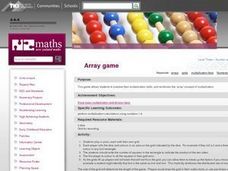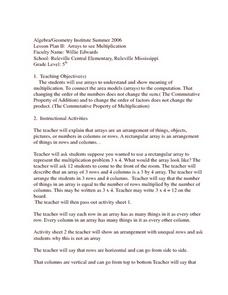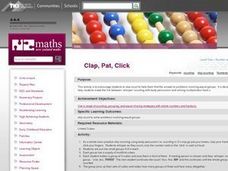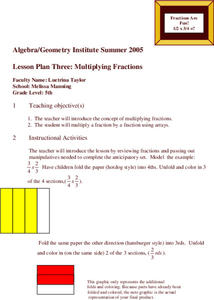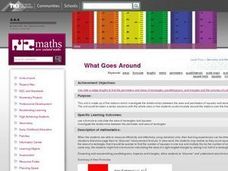Curated OER
Multiplication Strategies - A Day at the Zoo
This is an amazing 33-page resource for teaching multiplication! Your mathematicians will discover the connection between multiplication and repeated addition. They also will work collaboratively with arrays while studying zoo animals....
Curated OER
Array game
Second graders participate in a math game that allows the students to practice their multiplication skills, and reinforces the 'array' concept of multiplication. They perform multiplication calculations using numbers one to six and...
Curated OER
Arrays To See Multiplication
Fifth graders examine multiplication. They construct arrays to demonstrate specific multiplication facts. They identify examples and non-examples of arrays. Students use counters to model the commutative property of multiplication.
Curated OER
Building Arrays Using Excel Spreadsheets
Students create arrays using Microsoft Excel. In this technology-based math lesson, students expand their knowledge of multiplication by creating arrays on the computer using a spreadsheet program such as Microsoft Excel.
Curated OER
Working with larger arrays
Fifth graders use arrays to show the meaning of multipication in selected situations. They practice using large and small arrays. The instructional activity has numerous activities, which gives students more opportunities to display...
Curated OER
Multiplication and Division with Arrays
Students practice the commutative property, create and manipulate arrays and multiply and divide numbers.
Curated OER
Arrays Hooray
Second graders write and solve story problems which involve whole numbers, using addition, subtraction, multiplication, or division. They solve multiplication problems by using strategies other than counting all. They interpret and solve...
Curated OER
The Difference of Two Squares
Students practice the use of number properties through exploring the difference of two squares, creating an array model for multiplication, and work with decimal numbers. In groups, students explore patterns in an array and determine...
Curated OER
Blank Grids
Second graders model multiplication facts on a multiplication grid. They use the hundreds array to find groupings, known facts to solve multiplication facts. Students demonstrate the ability to use the multiplication facts. They are...
Curated OER
Multiplication Illustration
Third graders use literature and art to apply the principals of multiplication with three or more factors. They write and illustrate their own books following criteria outlined in a checklist imbedded in this plan.
Curated OER
Problem Posing Mathematics
Students work on multiplication problems. In this hands-on math lesson, students practice the concept of multiplication through manipulatives, arrays, pictures, and drawings. They discover other ways of learning multiplication besides...
Curated OER
Clap, Pat, Click
First graders practice the art of skip counting to help them find the answer to problems involving equal groups. They are encouraged to make the link between "whisper" counting with body percussion and solving multiplication facts.
Curated OER
Multiplying Fractions
Fifth graders explore the multiplication of fractions. Using paper folds, 5th graders observe multiplying by a fraction. They extrapolate multiplication problems from studying a written graphic.
Curated OER
Number in Geometry
Students use a number line to assist with their additions. They use a calculator to check for factors. Students are taught factors and multiples. They use array model of multiplication to define meaning. Students develop a wide range of...
Curated OER
Finding Addition Patterns
Students practice finding the sums of two-one digit numbers. In this addition lesson plan, students also record facts onto an addition chart.
Curated OER
Finding Sums to 6
Students explore the additive identity property where they add multiple numbers to get to the number 6. For this number 6 lesson plan, students also work on their addition charts.
Curated OER
What Goes Around
Fourth graders investigate the relationships between the area and perimeters of squares and rectangles. They calculate the perimeter of rectangles and squares using a formula. Students investigate the relationship between the perimeter...
Curated OER
Disappearing Magic Factors
Young scholars identify, through the number of rows and columns, the factors related to the product. In turn, they also discover how to find the missing factor, which is part of the fact family for that product.
Better Lesson
Better Lesson: Skittle Arrays
Skittles - yum!! You will instantly have your student's attention when you teach about arrays using Skittles. This detailed lesson walks you through the steps, provides worksheets for varying math levels, and includes a video of the...
Better Lesson
Better Lesson: Arrays Focusing on Rows and Columns
Third graders develop a meaning of multiplication through the use of arrays.
Better Lesson
Better Lesson: Writing Equations for Arrays
Second graders will learn how to make number sentences for an array by walking around the classroom and writing number sentences for the different arrays the teacher hangs around the room. A video is included, along with examples of...
Better Lesson
Better Lesson: Multiplication Facts With Arrays
Third graders are expected to fluently multiply and divide within 100. This allows students to practice their math facts and then check their work using area models.

